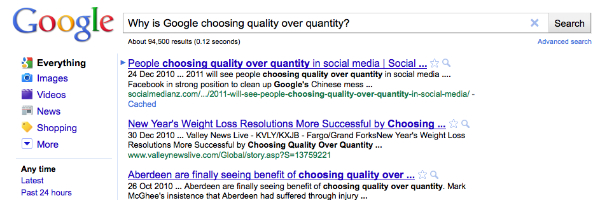Mobile search is gaining in both popularity and frequency of use in the U.S. and Western Europe, reports comScore.
In June 2008, 20.8 million U.S. mobile subscribers and 4.5 million European mobile phone subscribers accessed search during the month, an increase of 68% and 38% from June 2007, respectively.
The U.K. had the highest penetration of mobile subscribers using search at 9.5%, followed closely by the U.S. at 9.2%.
Google is proving to be the preferred brand for browser-based searches with a 60% share of mobile searchers.
The cell phone is quickly becoming the mobile PC. Businesses will have to pay attention to this vertical, and get onboard sooner than later as local search starts to dominate the mobile search space. Without a doubt, these portable devices are creating full-scale opportunities.
Posted on Sep 20 2008 11:12 pm by Web Copywriters
tags: Search Engines Social Media
|
category: Website promotions |
2 Comments

Headlines can be extremely effective tools to engage your online visitors and entice them to gather more information about your products, services and business.
Following are three guidelines to help you create headlines that connect:
1. It’s Not About You
Before you attempt to revamp your headline, get out of the self-centric mode most businesses tend to be stuck in. It sounds harsh, but when a person gets to your site, they don’t necessarily care about your business; they care about what you can do for them.
Continue reading →
Posted on Sep 8 2008 11:42 pm by Web Copywriters
tags: Website Conversions Writing for the Web
|
category: Writing for the Web |
2 Comments

Several headline styles work well on the Web, but they need to be relevant for optimal impact.
Here are some types of headlines that can be especially effective on the Web:
Authority Headline
Stop throwing away your money with credit cards
Benefit Headline
Increase your profits by up to 20%
Did You Know Headline
Did you know .pro domains are now available?
How to Headline
How to revive your marriage
Question Headline
Is your website working for you?
Standard News Headline
(New product) gets top marks in U.S. study
Top # List
Top 10 reasons to switch to Mac
To learn more about headlines, you can check out: Writing Website Headlines that Connect.
Posted on Sep 8 2008 7:14 pm by Web Copywriters
tags: Writing for the Web
|
category: Writing for the Web |
1 Comment
Google is releasing Google Chrome browser in 100 countries on Sept. 2 to take on Internet Explorer and Firefox, and make the Web a better place.
Google Chrome promises to be “clean and fast,” and run today’s complex web applications more efficiently. For instance, by keeping each tab in an isolated “sandbox,” Google claims it is able to prevent one tab from crashing another, and provide improved protection from suspect sites.
Plus, Google says it’s improving speed and responsiveness across the board. “We also built a more powerful JavaScript engine, V8, to power the next generation of web applications that aren’t even possible in today’s browsers,” reported the search engine giant.
Continue reading →
Posted on Sep 2 2008 1:23 am by Web Copywriters
tags: Search Engines
|
category: Web world at large |
Leave a comment

Many organizations are jumping on the green bandwagon, and consumers are witnessing vast claims of environmental benefits or greater sustainability.
However, as superficial claims continue to be exposed, consumers are distrustful of the credibility and honesty of green marketing messages — on and off the Web.
To overcome this lack of trust and avoid the greenwashing accusations, Forrester’s Cindy Commander suggests marketers need to ensure their green strategies adhere to the seven Es of green marketing:
- Continue reading →
Posted on Aug 18 2008 11:49 am by Web Copywriters
tags: Web Content Strategy Web Design
|
category: Writing for the Web |
Leave a comment

In a recent article, we explored how Internet users like to gather information on the Web, and how they process it.
More than 63% of Internet users indicated in our online poll the written word is their choice of communications on the Web. However, according to neurolinguistics expert Dr. Genie Z. Laborde, only 20% of people are primarily auditory, meaning they gather and process information most effectively via written text and the spoken word.
Dr. Laborde notes 40% of people are strongly visual, and 40% are kinesthetically dominant when it comes to learning.
So while the majority of people indicated they prefer accessing information on the Web through web writing, it’s in website owners’ best interest to support and augment web copy with other communication forms, i.e. visuals, to connect with a higher percentage of people.
Continue reading →
Posted on Aug 6 2008 1:27 am by Web Copywriters
tags: Web Content Studies Website Conversions
|
category: Writing for the Web |
3 Comments

More than 63% of Internet users indicated in a recent Webcopyplus poll the written word is their choice of communications on the Web.
However, according to psychologist, educator and neurolinguistics expert Dr. Genie Z. Laborde, only 20% of people are primarily auditory, meaning they gather and process information most effectively via written text and the spoken word.
Dr. Laborde notes 40% of people are strongly visual, and 40% are kinesthetically dominant when it comes to learning.
So while the majority of people indicated they prefer accessing information on the Web through web writing, it’s in website owners’ best interest to support and augment web copy with other communication forms to connect with a higher percentage of people.
Continue reading →
Despite recent economic woes, Forrester Research reports online retail sales are projected to grow 17 per cent in 2008 and surpass the $200 billion mark.
What is more, reports Principal Analyst Sucharita Mulpuru, the bulk of online retail sales are driven by tenured Gen Xers and Boomers, a cross-section of the web buyer population that values the convenience of the online channel and is actively spending more on the Web.
She noted: “These folks are less price-sensitive, disproving the theory that online shopping inevitably leads to brand-disloyal shoppers.”
Gen Xers account for 34% of all online shoppers, while Boomers represent 38%.

Google is reducing ads on web pages to an all-time low, which has many people scratching their heads.
“Virtually any other company facing slow economic times would be interested in increasing the places in which it could sell ads,” wrote Saul Hansell, in the New York Times article Google deliberately sells fewer ads – and may have gone too far. “It certainly wouldn’t take steps to reduce them.”
Meanwhile, Jonathan Rosenberg, Google’s Senior Vice-President for Product Management, said that Google has no plans to increase its coverage because of its efforts to improve what it calls “ad quality.”
Continue reading →
Posted on Jul 21 2008 3:12 am by Web Copywriters
tags: Search Engines
|
category: Web world at large |
2 Comments
Increasigly impatient online consumers are opting for fixed-price purchases over auctions, reports Catherine Holahan in the BusinessWeek article “Auctions on eBay: A Dying Breed.”
Sales at Amazon.com, the leader in online fixed-price goods sales, rose 37% in the first quarter of 2008. At eBay, where auctions make up 58 per cent of the site’s sales, revenue rose just 14%.
Hence, fixed-priced items appears key to eBay’s future growth. EBay’s “Buy It Now” business, where consumers can purchase auction items at a set price, makes up 42% of all goods sold on eBay and is growing at an annual 22% pace. That’s the fastest among eBay’s shopping businesses.
It shows just how impatient Web users are. The novelty of the Web is gone. Consumers just want to get to a site, complete a task and move on in as little time as possible.
It seems the term “browsing the Web” is quickly becoming obsolete.
Posted on Jul 13 2008 7:16 pm by Web Copywriters
|
category: Business & marketing |
1 Comment










